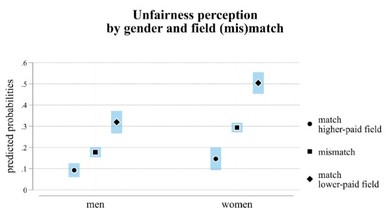New Publication "Fairness Evaluations of Higher Education Graduates’ Earnings: The Role of Female Preference for Equality and Self-Interest"
17.02.2025
"Educational and occupational horizontal segregation significantly contribute to economic inequalities. However, the perceived fairness of these disparities has been underexplored."
Anna Zamberlan, Diana Galos, Susanne Strauß, and Thomas Hinz investegated how higher education students evaluate the fairness of realistic earnings for graduates across different fields of study. They used a novel survey experiment from the German Student Survey (2021) with an analytic sample of 15,759 students.

Overall, the authors examined five hypotheses related to the concepts of "Female preference for equality" and "Self-interest" as well as the interrelation between the two of them. These are based on the following theoretical perspectives and their interplay:
(1) Female preference for equality, where women generally favor smaller earnings disparities, and
(2) Self-interest biases, where individuals have higher reward expectations for graduates in their own field of study.
The findings of the study support both perspectives: women and respondents from fields associated with lower earnings perceive greater unfairness. Most notably, the authors observed an interaction between the two mechanisms: women are particularly likely to view earnings disparities as unfair when such perceptions align with their self-interest.

